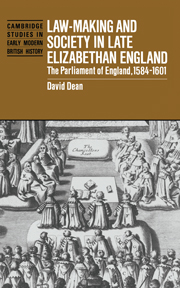Book contents
- Frontmatter
- Contents
- Acknowledgements
- Note to the reader
- List of abbreviations
- Introduction
- 1 Initiation and procedure
- 2 Supply and the general pardon
- 3 The crown and the state
- 4 Religion and the church
- 5 The commonweal
- 6 Law reform
- 7 Private legislation
- 8 Expiring laws continuance acts
- Epilogue: the Parliament of 1604
- Conclusion
- Index of acts
- Index of bills
- General index
1 - Initiation and procedure
Published online by Cambridge University Press: 14 September 2009
- Frontmatter
- Contents
- Acknowledgements
- Note to the reader
- List of abbreviations
- Introduction
- 1 Initiation and procedure
- 2 Supply and the general pardon
- 3 The crown and the state
- 4 Religion and the church
- 5 The commonweal
- 6 Law reform
- 7 Private legislation
- 8 Expiring laws continuance acts
- Epilogue: the Parliament of 1604
- Conclusion
- Index of acts
- Index of bills
- General index
Summary
On the night of Monday 9 April 1593 a weary Nicholas Saunders wrote a letter to his friend William More from his chamber at Blackfriars. Saunders had just spent an exhausting few days in parliament where he sat as MP for Haslemere. More, who had been elected knight of the shire for Surrey, had already returned home as it was close to the end of the session. ‘I am very glad for your owne sake’, Saunders wrote, ‘yt you are quiet now at home free from ye wearisome attendance here, so I am sory for myne owne sake yt you are gone in yt I am haulf out of countenaunce wanting your presence here.’
Saunders still had the energy to inform his friend in detail of the parliamentary business he had missed. Since More had departed much parliamentary time had been taken up with the Lords' bill seeking to ‘explain’ the 1581 statute of obedience requiring all subjects to attend divine service on Sundays. The committee had met on the very afternoon More left ‘and stayed untill viii a clocke’. They agreed on nothing but ‘a generall mislyke of ye Bill, some greatly disliking ye title, some utterly condemning ye Preamble, many others finding many other faults in ye body of ye bill’. On the following day Vicechamberlain Thomas Heneage reported their discussions and moved for a conference with the upper house. The Commons agreed, but only‘with very great difficulty’, and at the conference many amendments were discussed with legal advice from the judges.
- Type
- Chapter
- Information
- Law-Making and Society in Late Elizabethan EnglandThe Parliament of England, 1584–1601, pp. 5 - 33Publisher: Cambridge University PressPrint publication year: 1996

